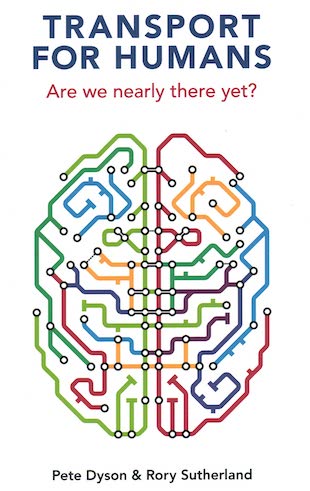
“Thinking makes it so” is a line from Hamlet which the authors of Transport for Humans (Pete Dyson and Rory Sutherland) reference when talking about perceptions of time for us humans when we are travelling.
As someone who has travelled far, far more than the average human (the geek in me tracked 369,000 miles of air travel alone in 2015) over my lifetime, with tinnitus and partial hearing loss to remind me, I have always loved to apply my curiosity to the travel experience and what is and can be done to improve it.
Clearly, I, therefore, love this book and it does spur thoughts and ideas from me. If you’d like to see inside a conversation between Rory and me and how he has this ability to stimulate ideas as he shares his own, do watch or listen to our conversation on #whatcomesnextlive.
For today, a few thoughts of my own, inspired by some ideas in the book. I hope some of these are useful to you in considering your own travel. Oh, and if this is of interest, buy the book.
Walking feels faster than waiting
- On a repeated journey, if I know that at some stage I will need to wait (eg at baggage claim on arrival), I deliberately take my time walking through the airport prior to arriving at baggage claim.
Waiting in comfort makes time pass more quickly
- On the contrary to waiting at baggage claim, back in the days when I used to go through Miami airport about every week, normally then connecting to another flight, the geek in me used to time how long it would take me to disembark, walk to the Global Entry machines, go through the flight connections using TSA Pre, then walk to the Admirals Club lounge to wait for the next flight, where I could wait in comfort with a drink, food and my phone or laptop to occupy me. Eight minutes was my record 😉
A good night’s sleep
- The book notes that human sleep cycles are approximately ninety minutes long and we need around five of them each night, so some overnight journeys are too short, something “sleeper” trains in the UK solved long ago by allowing passengers to remain on board at their destination until around 7 am even if they arrived at or before 5 am.
- For me, my default overnight route from the Caribbean to Europe was Miami to London, which was over 8 hours long. I would get on board, eat and drink something, and then sleep solidly for about six hours. If routing to use miles and found that the options for me were either to go via New York (about 6 hours to London) or, say, Chicago (nine hours), I would always choose Chicago as it allowed me to get a good night of sleep before arriving in London to work the next day.
Harnessing the return trip effect
- In the book, they talk about the “return trip effect”, that the return leg of a trip feels faster.
- This truly struck a chord with me, as I unconsciously applied a lot of the learnings from this in planning my travel over the years. In essence, if we travel somewhere for the first time we tend to be overly optimistic at forecasting the journey length on the outbound journey so that direction can drag, but on the return, we know what to expect.
- As I often did the same journeys as well as transit the same airports (I literally played a game a few times at Miami airport to see if I could walk parts of the terminal with my eyes closed and then know what shops I was walking past), we can use this to our advantage if we repeat journeys, as we can more accurately forecast how long a journey may take, as well as what the pinch points and points of potential perceived delay or irritation may be.
- As one example, whenever I would fly long haul into Canada I would make sure my phone was well charged before landing, as I knew I could be waiting at least an hour at border control but that they allowed the use of phones on their wifi network, so I could take that time to occupy myself, as long as my phone was charged.
